Julius Caesar: Key Quotations (AQA GCSE English Literature): Revision Note
Exam code: 8702
Here, we will analyse key quotes grouped according to the following themes:
Power and leadership
Manipulation and self-promotion
Fate and superstition
Honour and bravery
By knowing the play well, you will be able to refer to key pieces of dialogue or events in your answers. This will help produce a convincing and thorough interpretation of the whole play. Examiners ask you to form a strong argument that examines the theme in the question, and to use references (or refer to) key phrases or words as supporting evidence. This means that quotes should be linked closely to a point you make about a theme.
Power and leadership
The play, Julius Caesar, is named after a real Roman emperor who was betrayed and assassinated by friends and fellow senators. Shakespeare uses this historical event to examine the power-hungry political class and the resulting chaos caused by fear and paranoia. In this way he challenges the legitimacy of the ruling class.
Paired quotations
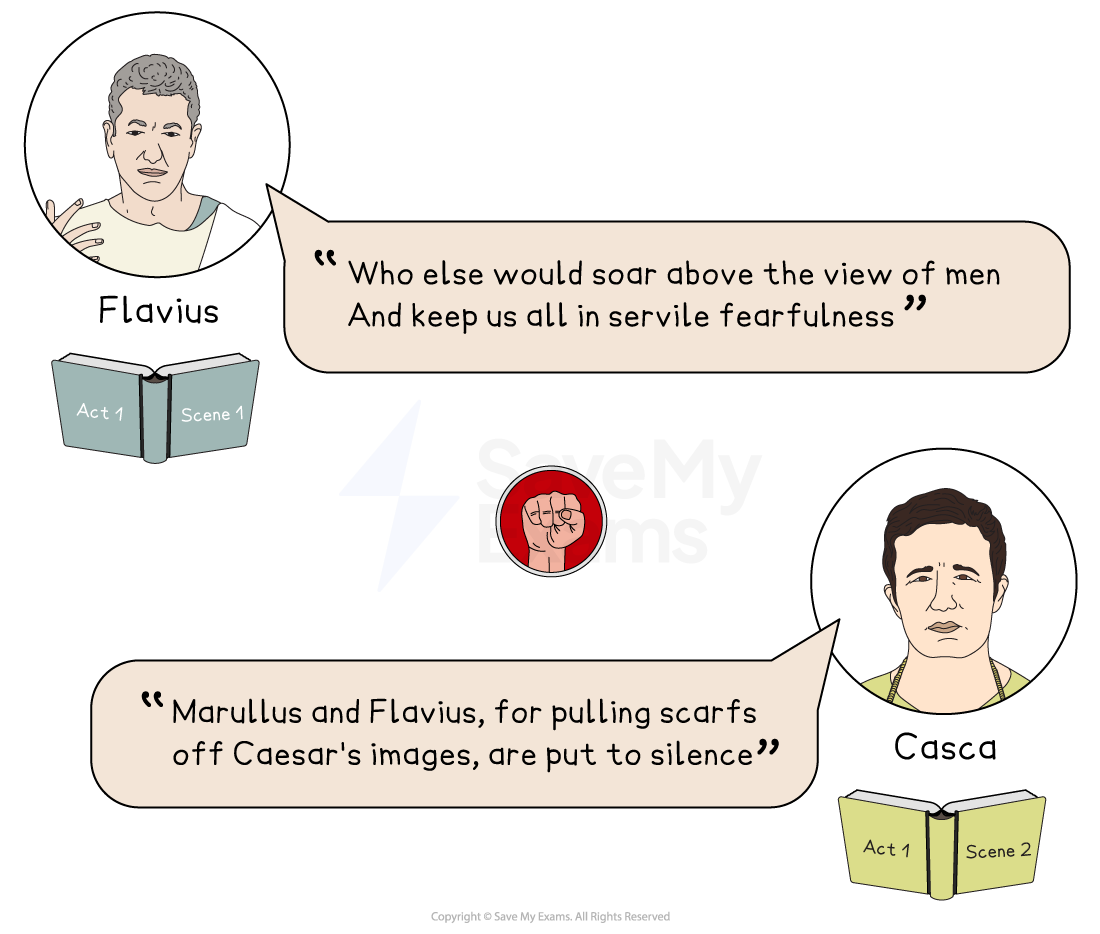
“Who else would soar above the view of men
And keep us all in servile fearfulness” — Flavius, Act 1 Scene 1
“Marullus and Flavius, for pulling scarfs
off Caesar's images, are put to silence" — Casca, Act 1 Scene 2
What the quotations mean
In the exposition (opens in a new tab), Flavius, a tribune (an official responsible for maintaining citizens’ rights) warns the rejoicing crowds that they should be careful not to glorify Caesar:
He suggests that too much power will make Caesar fly (“soar”) above average citizens and make frightened servants of them
In the rising action (opens in a new tab), audiences learn that Flavius has been punished for his protest (taking down the “scarfs” that decorated Caesar’s statues):
Casca, a conspirator against Caesar, tells Cassius and Brutus that Flavius and Marullus have been silenced, perhaps implying they have been killed
Analysis
Shakespeare shows a hierarchical society wherein citizens glorify leaders:
Stage directions say the scene includes “commoners”, like a “cobbler”
Shakespeare presents Flavius as a man of the “people” rebelling against powerful leaders that can easily become tyrants:
Vivid imagery (opens in a new tab) is used to warn the people that Caesar’s power will rise so high he will look down on the commoners from the sky as if a god
The emotive “servile fearfulness” implies Caesar will be a harsh ruler
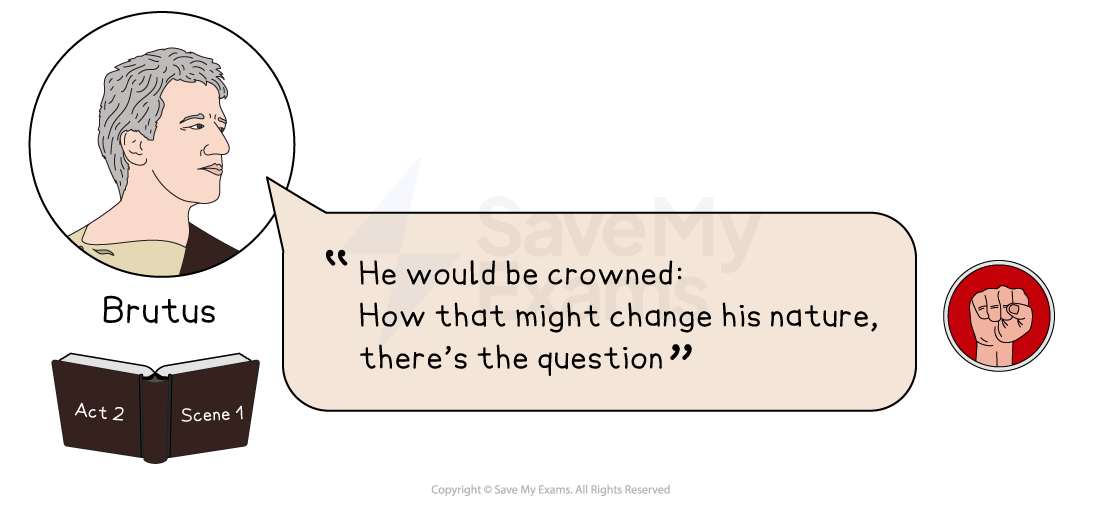
“He would be crown’d:
How that might change his nature, there’s the question” — Brutus, Act 2 Scene 1
What the quotation means
Brutus considers his decision to betray Caesar: he wonders if Caesar will change if he becomes king
Analysis
Shakespeare illustrates the paranoia and suspicion within the political class via an intimate soliloquy (opens in a new tab) in which Brutus questions Caesar’s rise to power:
Brutus’ certainty that power corrupts demonstrates Shakespeare’s portrayal of flawed human beings placed in positions of great power
This presents the tensions between natural human emotion and leadership
Examiner Tips and Tricks
Examiners suggest you use the extract as support for a clear argument about Shakespeare’s presentation of the theme throughout the text. Therefore, it is a good idea to acknowledge where the scene in the extract appears in the play, and how this may be meaningful.
Manipulation and self-promotion
Julius Caesar examines the power of language, particularly the way the ruling class use skilful rhetoric (opens in a new tab) to personal benefit. The play depicts powerful political figures employing sophisticated language to deceive, form alliances, and control the public.
Paired quotations
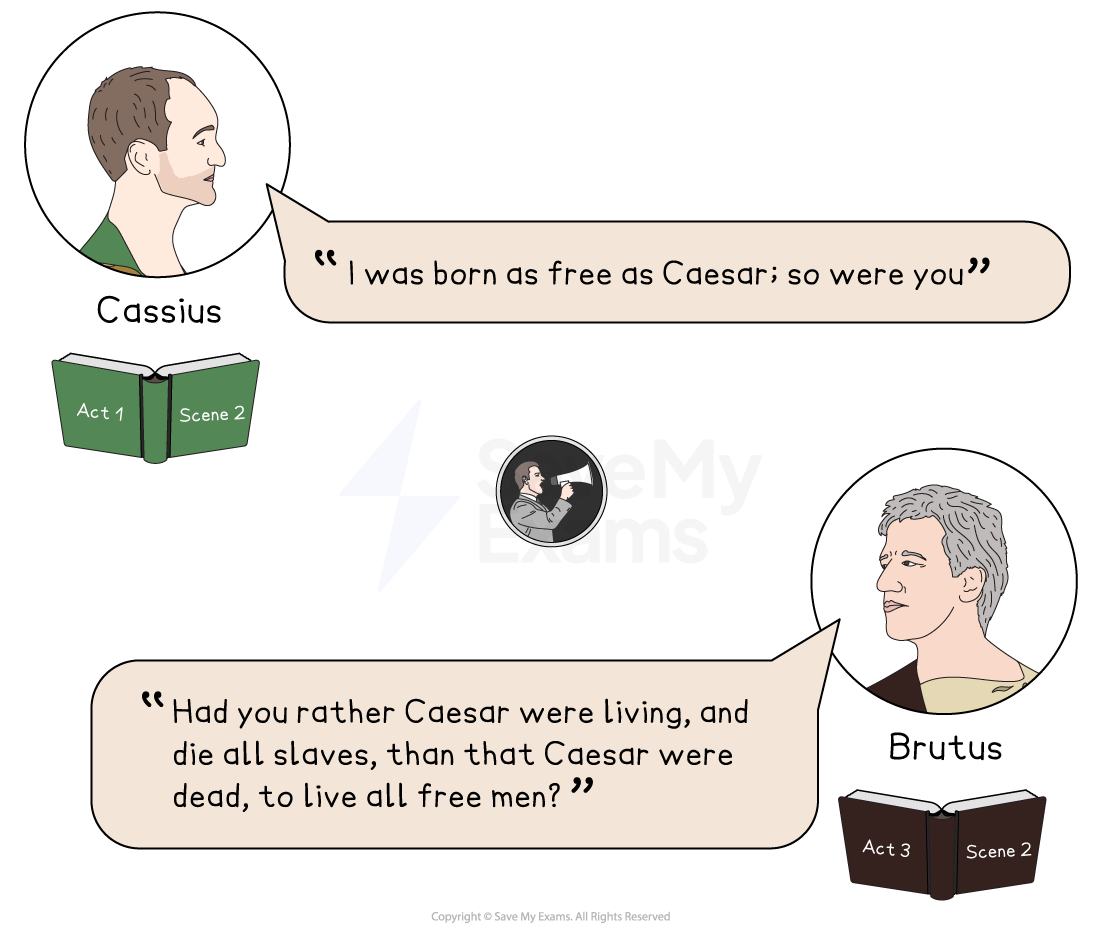
“I was born as free as Caesar; so were you” – Cassius, Act 1 Scene 2
“Had you rather Caesar were living, and
die all slaves, than that Caesar were dead, to live
all free men?” – Brutus, Act 3 Scene 2
What the quotations mean
Cassius tries to persuade Brutus to help him prevent Caesar’s rise
He tells Brutus that he and Caesar are both the same, that they are free and equal
Later, in the climax (opens in a new tab) of the play, Brutus appears to mirror Cassius’ earlier words, persuading his listeners that Caesar had to be killed so they could be “free men”
Analysis
Shakespeare illustrates the power of language through the senators’ rhetoric:
Cassius uses emotive language to remind Brutus that all men are born “free”, connoting to the idea of democracy
The emphatic short phrase “so were you” creates a tone of calm certainty
Later, Shakespeare creates irony (opens in a new tab) in the parallels between Cassius’ persuasive words and those of Brutus, highlighting the power of language to persuade:
Brutus’ rhetorical question employs logos (opens in a new tab) to convince the public they are now free
Paired quotations
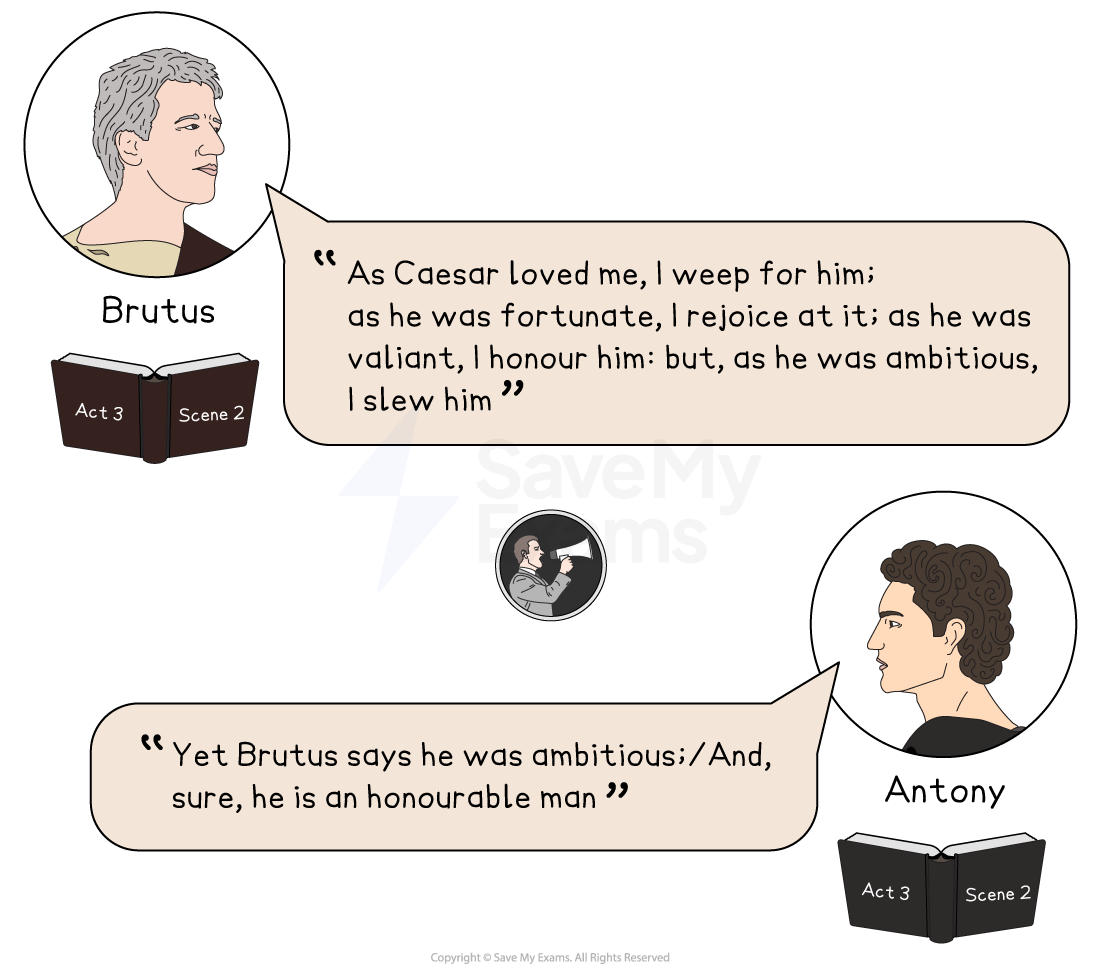
“As Caesar loved me, I weep for him;
as he was fortunate, I rejoice at it; as he was
valiant, I honour him: but, as he was ambitious, I
slew him” – Brutus, Act 3 Scene 2
“Yet Brutus says he was ambitious;
And, sure, he is an honourable man” – Antony, Act 3 Scene 2
What the quotations mean
During Caesar’s funeral, Brutus gives “public reasons” for the assassination:
He says he loved Caesar, celebrated his success and honoured his bravery (that he was “fortunate” and “valiant”), but killed him (“slew”) for his ambition
Afterwards, Antony speaks more persuasively, criticising Brutus for misrepresenting Caesar and stirring up the crowd against the conspirators:
He implies Brutus’ words are wrong and that his honour is dubious
Analysis
Brutus’ language is appropriately solemn and gracious for Caesar’s funeral:
A tone of authority and respect is created with anaphora (opens in a new tab) (repeated “as he was”), but this is also used to promote his own good qualities
Brutus employs ethos (opens in a new tab) to persuade listeners of his credibility: he honours Caesar’s bravery, implying he is loyal and reasonable
He suggests he is compassionate with pathos (opens in a new tab) (“loved”, “weep” and “rejoice”)
The list ends with logos, suggesting logic: he had no choice but to kill Caesar
Shakespeare illustrates the delicate nature of honour and integrity in the ruling class:
Antony’s ironic speech aims to expose Brutus as hypocritical
His repetition of Brutus’ own words are spoken with suspicion, changing public opinion about both Caesar and Brutus
Examiner Tips and Tricks
Examiners repeatedly state that marks are rewarded for analysis of writer’s methods and effect on audiences. In fact, quotes are considered references and therefore support your interpretation and understanding of the play. This means you can use your own words to paraphrase quotes or refer to key words within them, as long as they support and illustrate your point well.
Fate and superstition
Shakespeare’s plays typically explore the difficult relationship between humans and nature or the supernatural, and Julius Caesar is no different. The play illustrates how omens and supernatural warnings are ignored by men in favour of logic and reason.
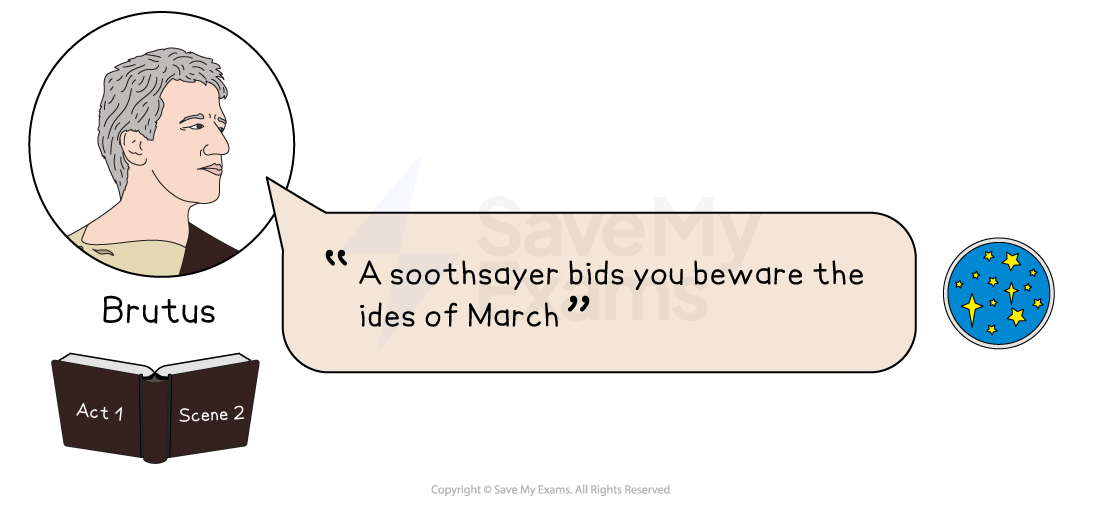
“A soothsayer bids you beware the ides of March" — Brutus, Act 1 Scene 2
What the quotation means
In the exposition, a soothsayer (a fortune teller or prophet) warns Caesar of the “ides of March”, a day marked as the halfway point or ‘divider’ of March
Analysis
Shakespeare foreshadows (opens in a new tab) conflict by disrupting a celebration with an ominous warning, emphasised by the repetition of the word “beware”:
It is first said by a soothsayer, then Brutus, then again the soothsayer
In Act 2 Scene 1, Brutus asks his servant if the following day is the “ides of March”:
This heightens tension for audiences already aware of the historical event
Julius Caesar was assassinated on the 15th March 44BCE
Paired quotations
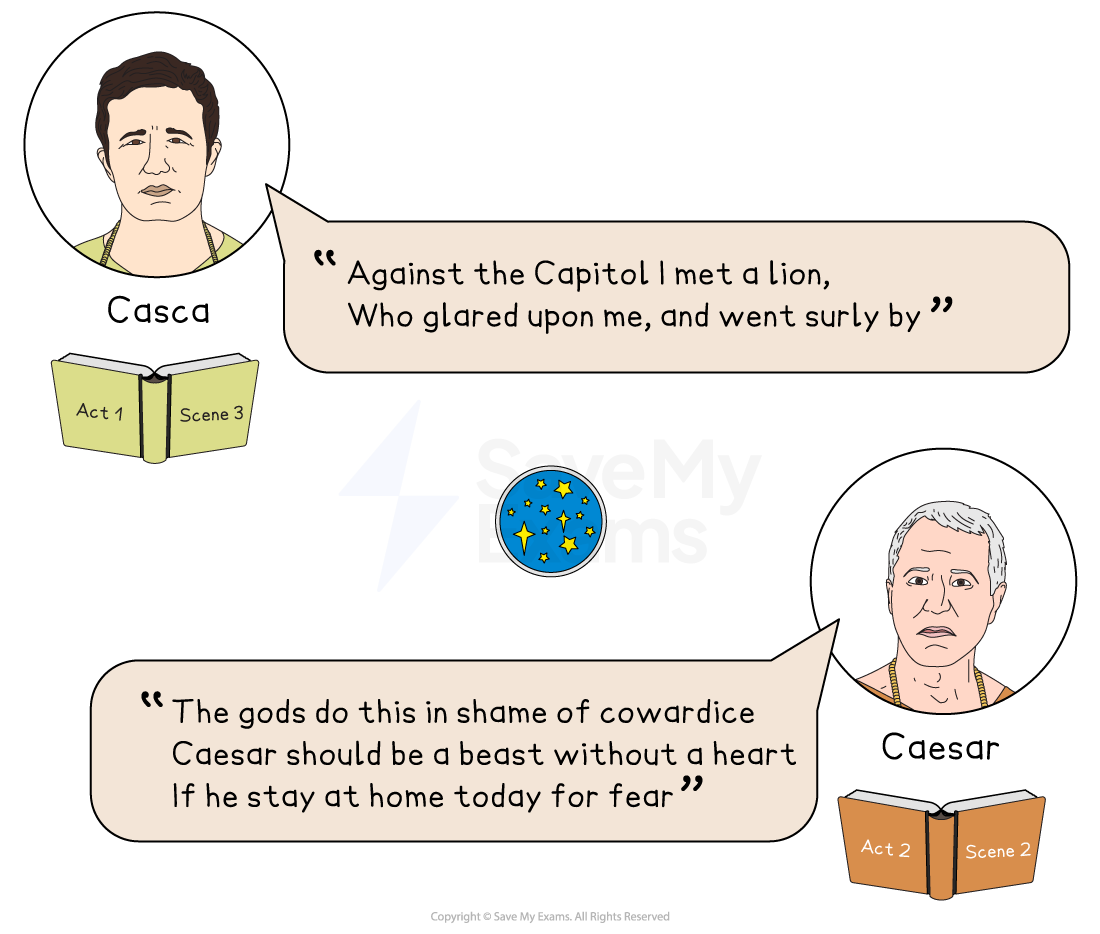
“Against the Capitol I met a lion,
Who glared upon me, and went surly by”— Casca, Act 1 Scene 3
“The gods do this in shame of cowardice
Caesar should be a beast without a heart,
If he stay at home today for fear” — Caesar, Act 2 Scene 2
What the quotations mean
In the exposition, Casca describes his vision of an angry lion in the senate (“Capitol”)
Later Caesar’s wife, Calpurnia, has a dream in which a lion appears in the street, but when she tells Caesar about it, he replies that he is too brave to stay safe out of fear:
He says the gods are simply testing his bravery
Analysis
Shakespeare foreshadows Caesar’s death with warnings that build suspense:
Arguably, this creates dramatic irony (opens in a new tab) as the play is based on historical events
Casca’s vision of a lion represents Caesar (symbolised as a lion throughout the play)
Caesar’s response to his wife’s vision is to refer to himself in the third person (opens in a new tab) to elevate his authority and stoicism:
He mirrors the symbolic comparison to a lion by referring to himself as a “beast” who would have no “heart” (courage) if he bowed to fearful omens
This presents the fragile relationship between humans and an unknown future
Honour and bravery
Shakespeare’s Julius Caesar explores the complex nature of humans' relationship with their certain mortality, and a need to face the unknown on their own terms. Shakespeare illustrates how this translates to societal values regarding honour and bravery.
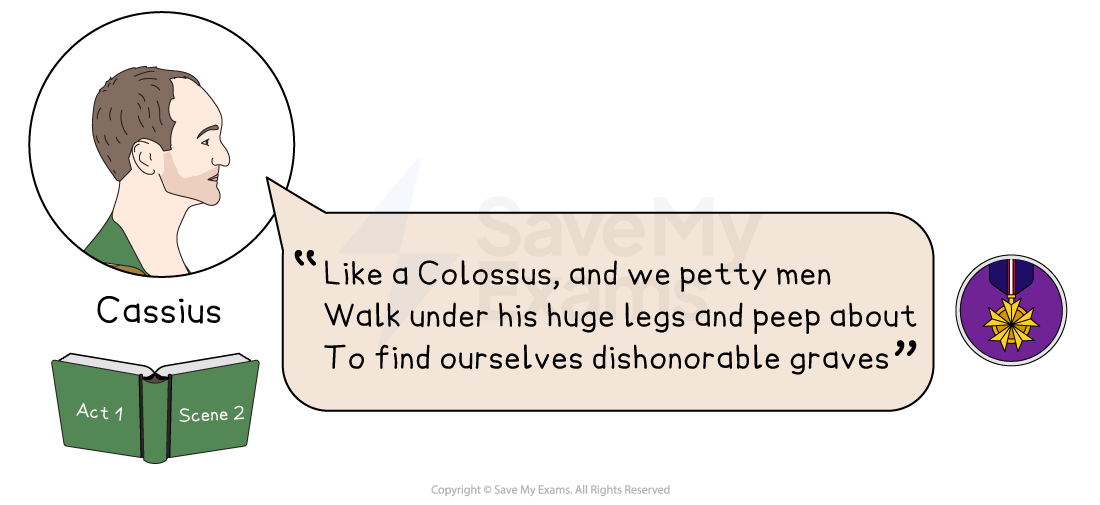
“Like a Colossus, and we petty men
Walk under his huge legs and peep about
To find ourselves dishonorable graves” — Cassius, Act 1 Scene 2
What the quotation means
Cassius says that if Brutus sides with powerful men such as Caesar (a “Colussus”) he will become a “petty” (small) man and die a “dishonourable” death
Analysis
Cassius’ hyperbole (opens in a new tab) exaggerates Caesar as a huge Greek statue or “Colossus”:
By contrasting Caesar’s size with imagery that describes him as “petty” and small, he presents this as an imbalance of power
However, his reference to “dishonourable graves” is most effective on Brutus:
Cassius understands that honour and a worthy death are synonymous in his society, and that Brutus is particularly devoted to such ideals
Shakespeare’s ironic portrayal of characters desperate to die bravely may be a challenge to aspects of stoicism that lead to needless death
Paired quotations
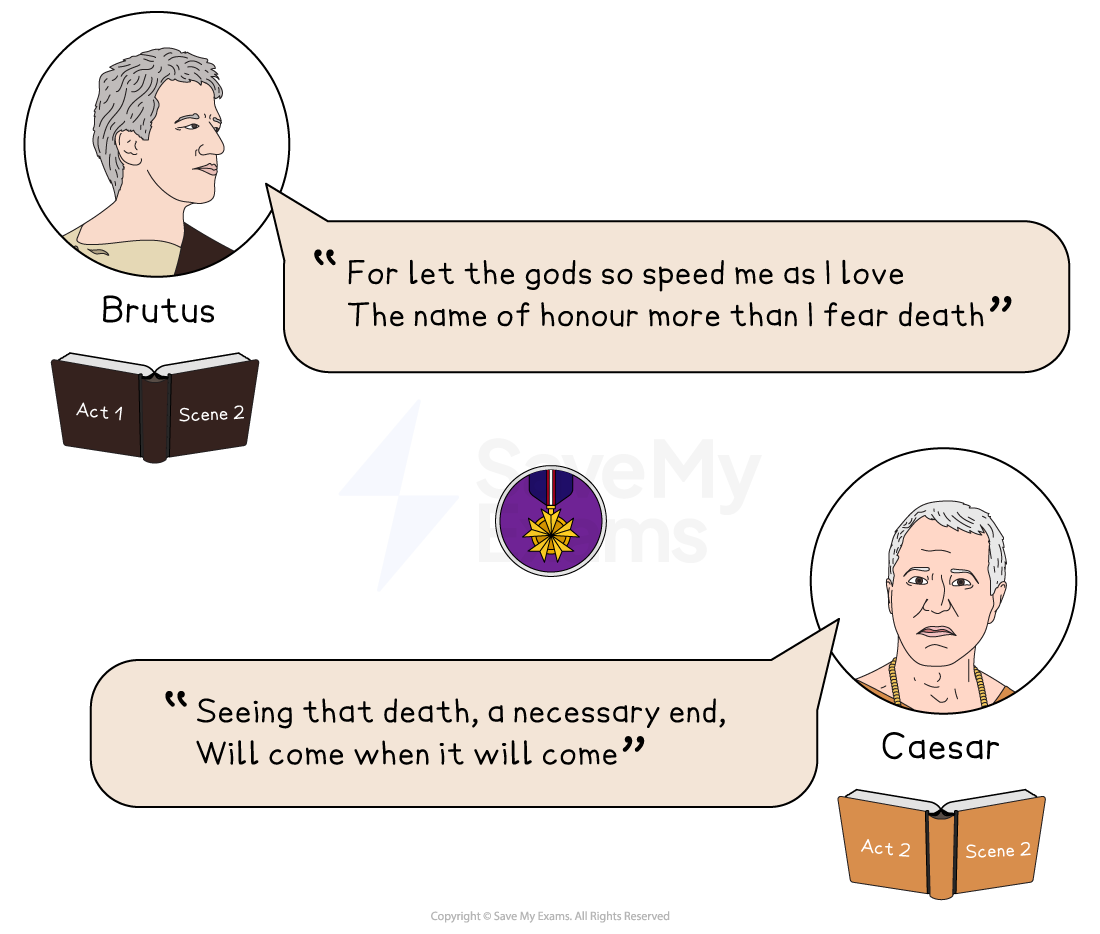
“For let the gods so speed me as I love
The name of honour more than I fear death” — Brutus, Act 1 Scene 2
“Seeing that death, a necessary end,
Will come when it will come” — Caesar, Act 2 Scene 2
What the quotations mean
Brutus asks the gods to give him “speed” as he is honourable and not afraid of death
Caesar also says humans have no control over their death, so should die bravely
Analysis
Shakespeare’s Brutus vainly tries to gain control by submitting to fated death:
Brutus’ certainty that the gods are on his side proves misguided
In the denouement (opens in a new tab), Brutus’ unquestioning belief in his own favoured fate leads to an uncelebrated death: he is captured and takes his own life
Shakespeare explores societal connections between bravery, honour and death:
Caesar’s words in Act 2 parallel those spoken by Brutus
Caesar is presented as a stoic character; his fateful attitude is clear in the repetitive, “Will come when it will come”
There is an irony to his courage: his wilful ignorance of warnings is what leads to his death
Sources
“Julius Caesar: Entire Play.” Shakespeare (MIT), https://shakespeare.mit.edu/julius_caesar/full.html (opens in a new tab). Accessed 28 July 2025
“Julius Caesar | Shakespeare Learning Zone.” Royal Shakespeare Company, https://www.rsc.org.uk/shakespeare-learning-zone/julius-caesar (opens in a new tab). Accessed 28 July 2025

Unlock more, it's free!
Was this revision note helpful?
